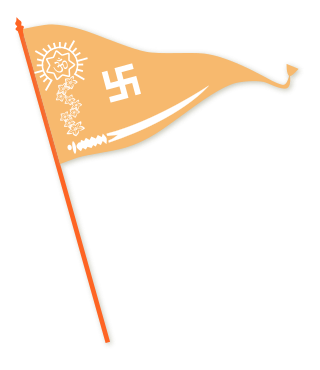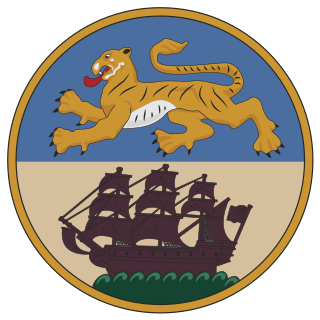
Vinayak Damodar Savarkar was an Indian politician, activist and writer. Savarkar developed the Hindu nationalist political ideology of Hindutva while confined at Ratnagiri in 1922. He was a leading figure in the Hindu Mahasabha. The prefix "Veer" has been applied to his name by his followers.

The Central Provinces and Berar was a province of British India and later the Dominion of India which existed from 1903 to 1950. It was formed by the merger of the Central Provinces with the province of Berar, which was territory leased by the British from the Hyderabad State. Through an agreement signed on 5 November 1902, 6th Nizam Mahbub Ali Khan, Asaf Jah VI leased Berar permanently to the British for an annual payment of 25 lakhs rupees. Lord Curzon decided to merge Berar with the Central Provinces, and this was proclaimed on 17 September 1903.

Akhil Bharat Hindu Mahasabha is a Hindu nationalist political party in India.

The Bombay Presidency or Bombay Province, also called Bombay and Sind (1843–1936), was an administrative subdivision (province) of India, with its capital in the city that came up over the seven islands of Bombay. The first mainland territory was acquired in the Konkan region with the Treaty of Bassein. Poona was the summer capital.

Abul Kasem Fazlul Huq, popularly known as Sher-e-Bangla, was a Bengali lawyer and politician who presented the Lahore Resolution which had the objective of creating an independent Pakistan. He also served as the first and longest Prime Minister of Bengal during the British Raj.
The National Unionist Party was a political party based in the Punjab Province during the period of British rule in India. The Unionist Party mainly represented the interests of the landed gentry and landlords of Punjab, which included Muslims, Hindus and Sikhs. The Unionists dominated the political scene in Punjab from World War I to the independence of India and the creation Pakistan after the partition of the province in 1947. The party's leaders served as Prime Minister of the Punjab. The creed of the Unionist Party emphasized: "Dominion Status and a United Democratic federal constitution for India as a whole".

Paramasivan Subbarayan was an Indian politician, freedom fighter and diplomat and was the First Minister of Madras Presidency, India's ambassador to Indonesia and Union Minister of Transport and Communications in Jawaharlal Nehru's government. He was the father of General P. P. Kumaramangalam, who served as India's Chief of Army staff, and of politician Mohan Kumaramangalam. He was also the grandfather of INC and BJP politician and Union Minister Rangarajan Kumaramangalam.

John Francis Ashley Erskine, Lord Erskine GCSI, GCIE was a British soldier, Conservative Party politician and administrator who served as Member of Parliament (MP) for Weston-super-Mare and Brighton. Erskine also served as the governor of Madras Presidency from 1934 to 1940.
The Krishak Sramik Party was a major anti-feudal political party in the British Indian province of Bengal and later in the Dominion of Pakistan's East Bengal and East Pakistan provinces. It was founded in 1929 as the Nikhil Banga Praja Samiti to represent the interests of tenant farmers in Bengal's landed gentry estates. Sir Abdur Rahim was its first leader. A. K. Fazlul Huq was elected leader in 1935 when the former was appointed as the president of the Central Legislative Assembly of India. In 1936, it took the name of Krishak Praja Party and contested the 1937 election. The party formed the first government in the Bengal Legislative Assembly. After the partition of British India, it was reorganized as the Krishak Sramik Party to contest the 1954 election, as part of the United Front. The coalition won the election and formed the provincial government in the East Bengal Legislative Assembly.

The first legislative assembly election for the Madras Presidency was held in February 1937, as part of the nationwide provincial elections in British India. The Indian National Congress obtained a majority by winning 159 of 215 seats in the Legislative Assembly. This was the first electoral victory for the Congress in the presidency since elections were first conducted for Madras Legislative Council in 1920. The Justice Party which had ruled the presidency for most of the previous 17 years was voted out of power. The assembly was constituted in July 1937 and C. Rajagopalachari (Rajaji) became the first Congress Prime Minister of Madras.

The third legislative council election to Madras Presidency after the establishment of dyarchical system of government by the Government of India Act, 1919, was held in November 1926. Justice party lost the election to Swaraj Party. However, as the Swaraja Party refused to form the Government, the Governor of Madras set up an independent government under the leadership of P. Subbarayan and with the support of nominated members.
The first legislative council election for the Madras Presidency after the establishment of a bicameral legislature by the Government of India Act of 1935 was held in February 1937. The Indian National Congress obtained a majority by winning 27 out of 46 seats in the Legislative Council for which the elections were held. This was the first electoral victory for the Congress in the presidency since elections were first conducted for the Council in 1920 and C. Rajagopalachari (Rajaji) became the Prime Minister. The Justice Party which had ruled the presidency for most of the previous 17 years was voted out of power. Congress also won the Legislative assembly election held simultaneously.

Provincial elections were held in British India in the winter of 1936–37 as mandated by the Government of India Act 1935. Elections were held in eleven provinces - Madras, Central Provinces, Bihar, Orissa, the United Provinces, the Bombay Presidency, Assam, the North-West Frontier Province, Bengal, Punjab and Sind.

Muhammad Ali Jinnah was a barrister, politician, and the founder of Pakistan. Jinnah served as the leader of the All-India Muslim League from 1913 until the inception of Pakistan on 14 August 1947, and then as the Republic of Pakistan's first governor-general until his death.
Bombay Legislative Assembly came into existence in 1937, as the legislature of Bombay Presidency, a province of India. It functioned until 1960, when separate states of Maharashtra and Gujarat were formed.
The elections to the two houses of legislatures of the Bombay Presidency were held in 1937, as part of the nationwide provincial elections in British India. The Indian National Congress was the single largest party by winning 86 of 175 seats in the Legislative Assembly and 13 of 60 seats in the Legislative Council.

The prime minister of Bengal was the head of government of Bengal Province and the Leader of the House in the Bengal Legislative Assembly in British India. The position was dissolved upon the Partition of Bengal during the partition of India in 1947.

The Bengal Provincial Muslim League (BPML) was the branch of the All India Muslim League in the British Indian province of Bengal. It was established in Dhaka on 2 March 1912. Its official language was Bengali. The party played an important role in the Bengal Legislative Council and in the Bengal Legislative Assembly, where two of the Prime Ministers of Bengal were from the party. It was vital to the creation of the Dominion of Pakistan, particularly after its election victory in 1946.

The prime minister of Assam was the head of government and the leader of the House in the Legislative Assembly of Assam Province in British India. The position was dissolved upon the Partition of India in 1947.
Sir Dhanjishah Bomanji Cooper was an Indian Parsi industrialist, politician and the first Prime Minister of Bombay Presidency. Cooper was made a Knight Bachelor in the 1937 New Year Honours.











